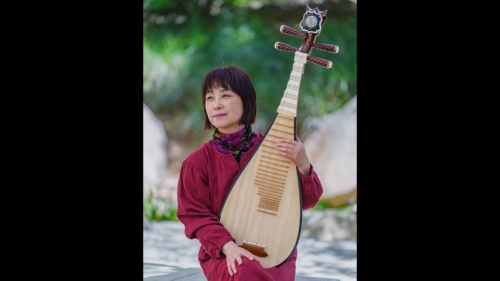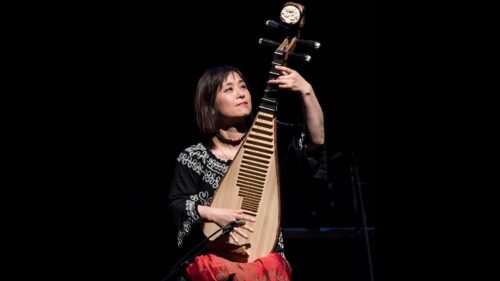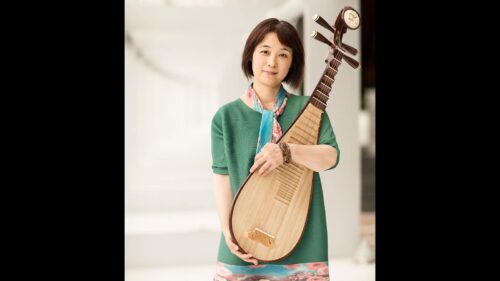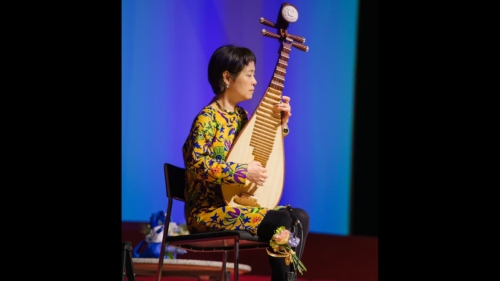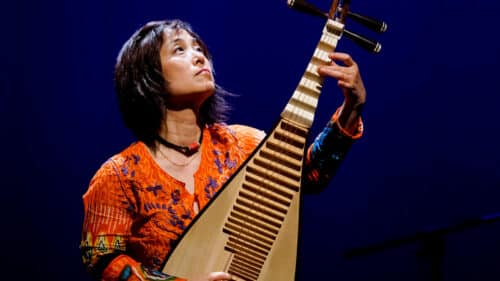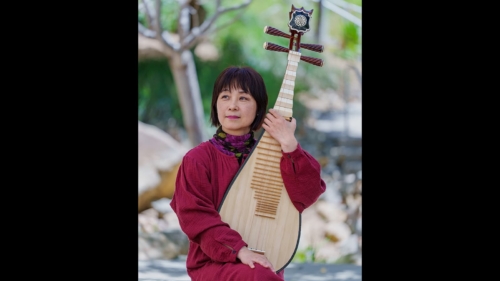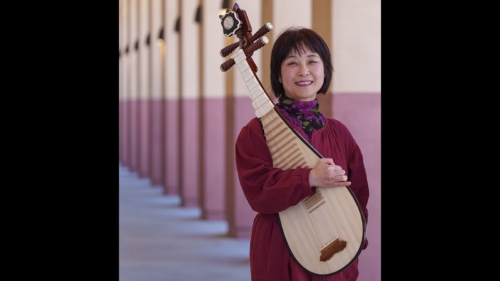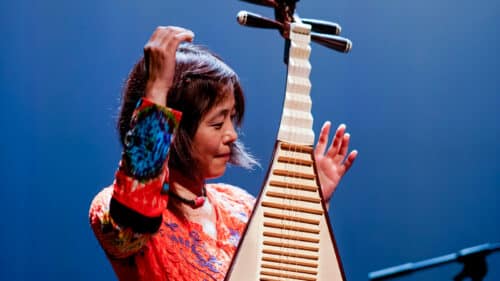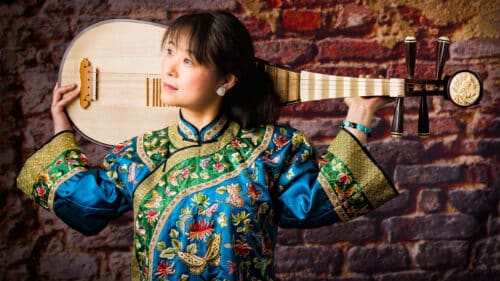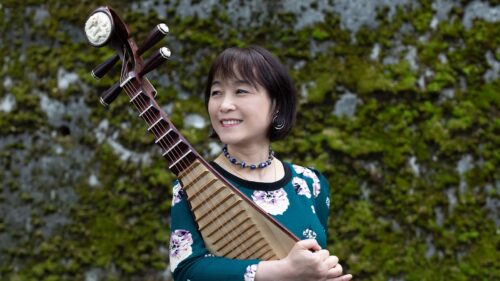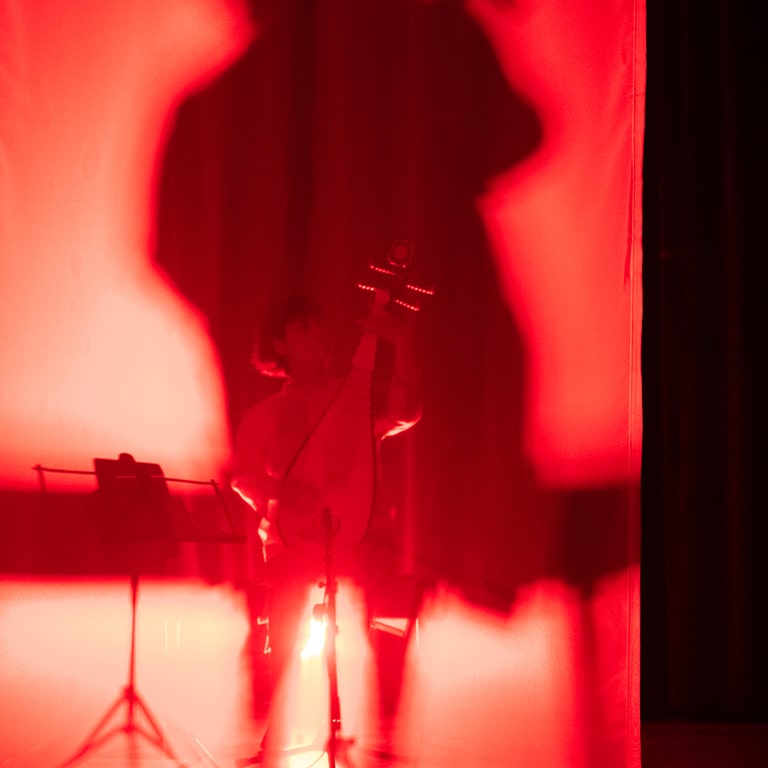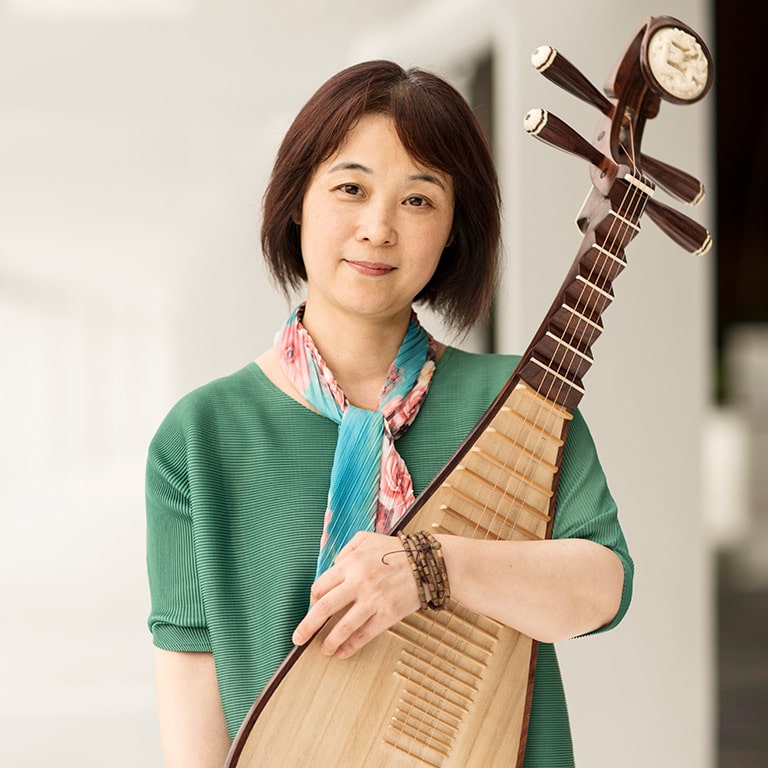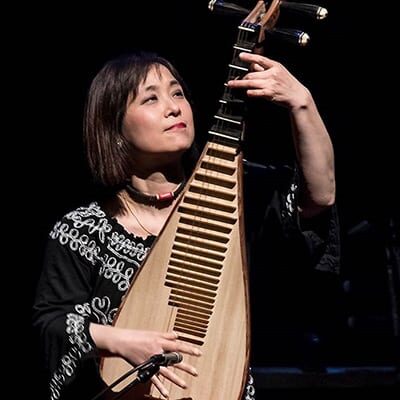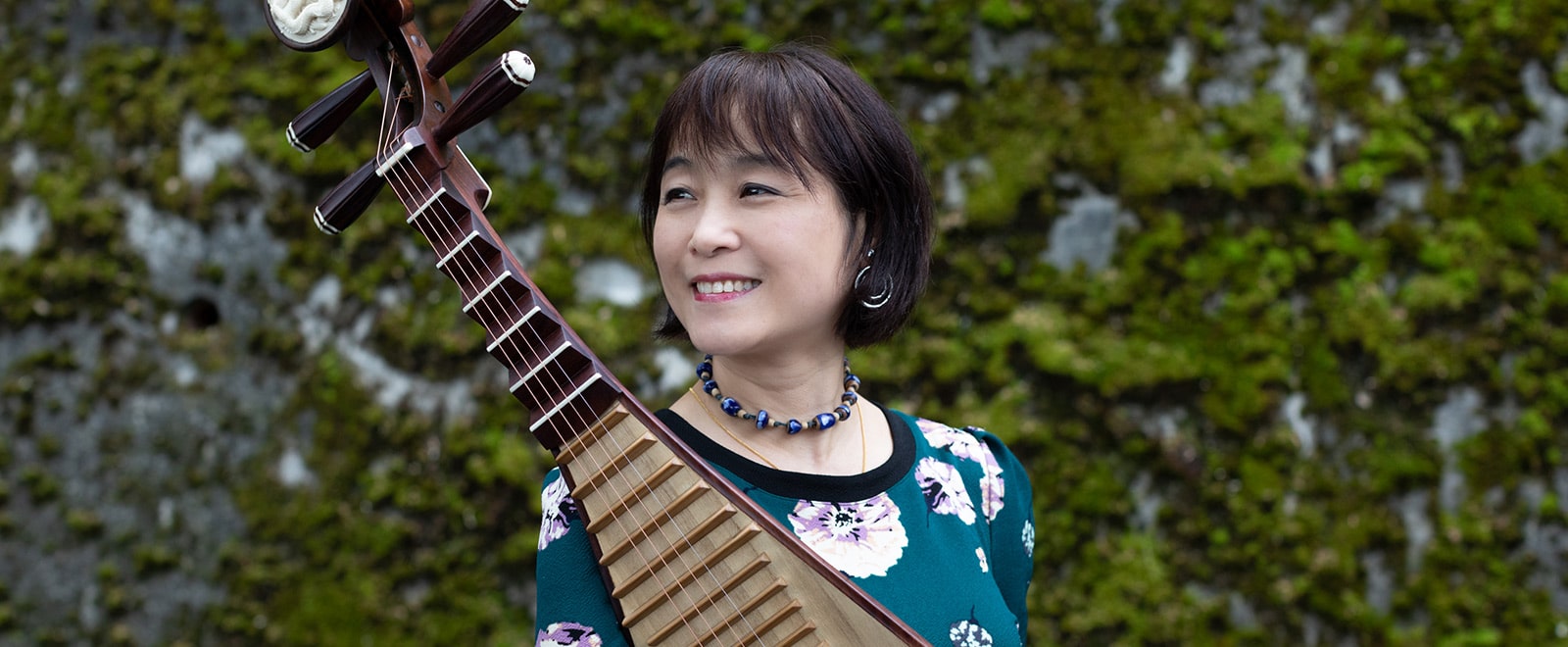
The New York Times“…the world’s finest player of the pipa…”
The Washington Post“The pipa player Wu Man has done a tremendous amount to raise the profile of her instrument (a Chinese folk instrument) and expand its repertoire.”
The New Yorker“…renowned pi-pa virtuoso, a magnetic player in whatever genre she chooses to explore…”
The Wall Street Journal“…arguably the pre-eminent ambassador for traditional Chinese music in the U.S. … Ms. Wu is a wonder on the pipa … She conjures rich soundscapes through tremolo, banding notes and preternaturally precise plucking.”
Los Angeles Times“Her playing is the last word in elegance.”
NPR Weekend Edition“…the world’s greatest virtuoso on an instrument that is over 2000 years old: the Chinese pipa.”
Financial Times“The virtuoso Wu Man pepped things up with a dancing tune on the pipa, the Chinese lute that she has almost single-handedly revived.”
Evening Standard“Wu Man is probably the greatest player of the Chinese pipa [and she] demonstrated her technique with lyrical melodies, dramatic tremolos and percussive snaps.”
Vancouver Sun“Zhao Jiping’s Second Pipa Concerto, which rounded out the first half of the program, proved the musical highlight of the evening. As many composers have discovered, combining traditional Chinese instruments with western orchestra is especially tricky. Zhao, best known for his many successful film scores, knew exactly what he wanted, and effectively integrated the sound of the pipa, slightly amplified, with orchestral backdrops that delightfully complemented the soloist.
The Concerto is cast in a single movement and combines a wealth of different materials without seeming patchy or purely episodic. Soloist Wu Man’s performance was nothing short of remarkable: supremely confident, showy when appropriate, always profoundly musical. Both the piece and the performance should grace a regular VSO Masterworks program; this was an achievement far too impressive for a targeted audience on a single special evening.”
Musical America“Adding a more vibrant edge was pipa player Wu Man, who sometimes gave extra muscle to the ensemble, but more significantly broke into plaintive solos. Perhaps the best music was in the purely instrumental sections, especially the electrifying duet played by violinist Johnny Gandelsman and Wu Man in which each player took turns with wild (though eloquent) flights of virtuosity.”
Wu Man belongs to a rare group of musicians who have redefined the role of their instruments, in her case, the pipa, a pear-shaped, four-stringed Chinese lute with a rich history spanning centuries. Not only is she recognized as the foremost pipa player in the United States, but she is also celebrated as an accomplished composer, educator, and one of the most prominent instrumentalists of traditional Chinese music. She has premiered hundreds of new works for the pipa, while spearheading multimedia projects to both preserve and create awareness of China’s ancient musical traditions. Her adventurous spirit and virtuosity have led to collaborations across artistic disciplines, allowing her to reach wider audiences as she works to cross cultural and musical borders. Her efforts were recognized when she was named Musical America’s 2013 “Instrumentalist of the Year,” marking the first time this prestigious award has been bestowed on a player of a non-Western instrument, and in 2021 when she received an honorary Doctorate of Music from the New England Conservatory of Music and an Honorary University Fellowship from Hong Kong Baptist University. Ms. Wu is a recipient of the 2023 National Heritage Fellowship from the National Endowment of the Arts (NEA), one of the United States’ most prestigious honors in folk and traditional arts. In 2023 she was additionally honored with the Asia Society’s Asia Arts Game Changers Award, an annual award presented in New York City which recognizes and honors artists and arts professionals for their significant contributions to contemporary art.
In the 2024-25 season, Wu Man performs four concertos for pipa and orchestra written for her, including Lou Harrison’s Pipa Concerto with the Omaha Symphony and Santa Fe Pro Musica Orchestra, where she also plays a work she composed, Blue and Green, arranged by Colin Jacobsen, who also conducts. Ms. Wu performs Zhao Jiping’s Pipa Concerto No. 2 with the Oregon Symphony, Lei Lang’s “Five Seasons” with the La Jolla Symphony, and Pulitzer Prize-winning composer Du Yun’s “Ears of the Book” with the New Haven Symphony. She premiered “Ears of the Book” with The Knights at Carnegie’s Zankel Hall in 2024, followed by a performance with the Detroit Symphony Orchestra.
This season, Ms. Wu joins the Juilliard Quartet as soloist on Tan Dun’s Concerto for String Quartet and Pipa, one of five works by living composers on a program presented by the Chamber Music Society of Lincoln Center. She also collaborates with the Verona Quartet in “Goin’ Home,” a program that explores an international concept of home, on tour in San Antonio, Washington, DC, and Rochester. The Verona Quartet performs Ms. Wu’s arrangement of “Glimpses of Muqam,” a traditional piece from Western China, as well as works by Dvořák, John Dowland, Wynton Marsalis, and Sulkhan Tsintsadze. Ms. Wu continues to tour with kamancheh player Kayhan Kalhor and tabla player Sandeep Das as the DoosTrio, exploring the ancient traditions of Persia, China, and India in a 21st-century program.
Having been brought up in the Pudong School of pipa playing, one of the most prestigious classical styles of Imperial China, Ms. Wu is now recognized as an outstanding exponent of the traditional repertoire as well as a leading interpreter of contemporary pipa music by today’s most prominent composers such as Tan Dun, Philip Glass, the late Lou Harrison, Terry Riley, Bright Sheng, Chen Yi, and many others. She was the recipient of The Bunting Fellowship at Harvard University in 1998, and was the first Chinese traditional musician to receive The United States Artist Fellowship in 2008. She is also the first artist from China to perform at the White House. Wu Man is a Visiting Professor at her alma mater the Central Conservatory of Music in Beijing and a Distinguished Professor at the Zhejiang and the Xi’an Conservatories. She has also served as Artistic Director of the Xi’an Silk Road Music Festival at the Xi’an Conservatory.
Ms. Wu has performed as a soloist with many of the world’s major orchestras, including the Austrian ORF Radio Symphony Orchestra, Boston Symphony Orchestra, Chicago Symphony Orchestra, Los Angeles Philharmonic, Moscow Soloists, Nashville Symphony, German NDR and RSO Radio Symphony Orchestras, New Music Group, New York Philharmonic, Seattle Symphony Orchestra, and the Stuttgart Chamber Orchestra. Her touring has taken her to the major music halls of the world including Carnegie Hall, Amsterdam’s Concertgebouw, the Great Hall in Moscow, the Kennedy Center, Lincoln Center, Opera Bastille, Royal Albert and Royal Festival Halls in London, and the Theatre de la Ville in Paris. She has performed at many international festivals including the Auckland Arts Festival, Bang on a Can Festival, BBC Proms, Festival d’Automne in Paris, Festival de Radio France et Montpellier, Hong Kong Arts Festival, La Jolla Summerfest, Lincoln Center Festival, Luminato, Mozart Festival in Vienna, NextWave! / BAM, Ravinia Festival, Silk Road Festival, Sydney Festival, Tanglewood, Wien Modern, WOMAD Festival, and the Yatsugatake Kogen Festival in Japan. She continually collaborates with some of the most distinguished musicians and conductors performing today, such as Yuri Bashmet, Dennis Russell Davies, Christoph Eschenbach, Gunther Herbig, Cho-Liang Lin, Yo-Yo Ma, David Robertson, Esa-Pekka Salonen, and David Zinman.
Among Ms. Wu’s most fruitful collaborations is with Kronos Quartet, with whom she began collaborating in the early 1990s. They premiered their first project together, Tan Dun’s Ghost Opera, at the Brooklyn Academy of Music in 1995. The work was recorded and released on Nonesuch in 1997. Wu Man and the Kronos Quartet also co-conceived the multimedia work A Chinese Home in collaboration with theater director Chen Shi-Zheng, which premiered at Carnegie’s Zankel Hall in 2009. Additional Kronos Quartet recordings featuring Wu Man for Nonesuch include Early Music, on which she plays the zhong ruan and da ruan (string instruments related to the pipa) in John Dowland’s Lachrymæ Antiquæ and the Grammy-nominated You’ve Stolen My Heart, an homage to the composer of classic Bollywood songs Rahul Dev Burman, featuring Ms. Wu alongside the Quartet, singer Asha Bhosle, and tabla player Zakir Hussain. She participated in the Quartet’s 40th Anniversary celebration concerts at Cal Performances in Berkeley, CA and at Carnegie Hall; was Artist-in-Residence with the Quartet in February 2016; became the second inductee into the “Kronos Hall of Fame” (joining Terry Riley); and composed her first piece for western instruments, Four Chinese Paintings, for the Quartet’s “50 for the Future” project. In November 2023, Wu Man participated on Kronos Quartet’s 50th anniversary celebration concert at Carnegie Hall, alongside artists such as Laurie Anderson, Bang on a Can All-Stars, Tanya Tagaq, and many more.
As a principal, founding musician in Yo-Yo Ma’s Silkroad project, Ms. Wu has performed throughout the U.S., Europe and Asia with the Silkroad Ensemble. She is a featured artist in the 2015 Emmy-Award-winning documentary The Music of Strangers: Yo-Yo Ma and The Silk Road Ensemble, as well as on the film’s 2017 Grammy Award-winning companion recording, Sing Me Home (“Best World Music Album”), which includes her original composition Green (Vincent’s Tune) performed with the vocal ensemble Roomful of Teeth. She has recorded six albums with the group: Silk Road Journeys: When Strangers Meet (2002), Silk Road Journeys: Beyond the Horizon (2005), New Impossibilities (2007), the CD/DVD A Playlist Without Borders / Live from Tanglewood (2013), and Sing Me Home (2016) on Sony Classical, as well as Off the Map (2009) on World Village. Her Silkroad Ensemble performances in recent years have included tours of the U.S. during the season and to summer festivals such as Tanglewood, Wolf Trap, Blossom, Ravinia, and Hollywood Bowl; a tour of Asia; and performances with Mark Morris Dance in Berkeley and Seattle. Last season, Ms. Wu created a newly commissioned work for Silkroad’s American Railroad initiative, the group’s most ambitious project to date that explores the history and impact of the Transcontinental Railroad and the immigrant communities who built it. She has been a leader of Silkroad’s popular Global Musicians Workshop since 2015, and recently spearheaded the program’s first-ever expansion to Huangzhou, China, in the summer of 2024.
Adamant that the pipa does not become marginalized as only appropriate for Chinese music, Ms. Wu strives to develop a place for the pipa in all art forms. Projects she has initiated have resulted in the pipa finding a place in new solo and quartet works, concertos, opera, chamber, electronic, and jazz music as well as in theater productions, film, dance, and collaborations with visual artists including calligraphers and painters. Her role has developed beyond pipa performance to encompass singing, dancing, composing, and curating new works. She has premiered works by Chinese composers including Zhao Jiping, Tan Dun, Bright Sheng, Du Yun, and Chen Yi. Other notable projects include Orion: China, co-written with Philip Glass for the 2004 Summer Olympics in Athens and recorded the following year; and Blue and Green, an original composition that she premiered with The Knights. In March 2019 Ms. Man and Yo-Yo Ma performed the American premiere of Zhao Lin’s A Happy Excursion with the New York Philharmonic. Recent projects have seen her rediscover, embrace, and showcase the musical traditions of her homeland, projects she has dubbed “Wu Man’s Return to the East.” In 2009, she was asked to curate two concerts at Carnegie Hall as part of the “Ancient Paths, Modern Voices” festival celebrating Chinese culture. Ms. Wu and the artists she brought to New York from rural China for the festival also took part in two free neighborhood concerts and a concert presented by the Orange County Performing Arts Society in Costa Mesa. In August 2012, she released a documentary DVD titled Discovering a Musical Heartland: Wu Man’s Return to China as part of her ongoing “Return to the East” project. In the film, she travels to little-explored regions of China to uncover ancient musical traditions that have rarely been documented before. Among the musicians she met on her journey were the Huayin Shadow Puppet Band, which she brought to the U.S. for the first time—touring to 11 cities around the nation. She has also toured around the world as a Master Musician in the Aga Khan Music Initiative—a group of performers, composer-arrangers, teachers, and curators who create music inspired by their cultural heritage of the Middle East, South and Central Asia, West Africa, and China.
Ms. Wu boasts a discography of over 40 albums including the Grammy Award-winning Sing Me Home (“Best World Music Album”) with the Silkroad Ensemble on Sony; the Grammy Award-nominated Our World in Song, featuring familiar folk songs from around the world arranged by her with Hawaiian instrumentalist Daniel Ho and Cuban percussionist Luis Conte; and Elegant Pipa Classics, which combines traditional pipa repertoire with modern compositions, both released by Wind Music. Traditions and Transformations: Sounds of Silk Road Chicago features her Grammy Award-nominated performance of Lou Harrison’s Pipa Concerto with the Chicago Symphony Orchestra, as well as a Grammy-nominated recording of Tan Dun’s Pipa Concerto with Yuri Bashmet and the Moscow Soloists on Onyx Classics. In May 2012, she released her Independent Music Award-nominated CD / DVD Borderlands, which traces the history of the pipa in China. It is the final installment of the acclaimed ten-volume “Music of Central Asia” ethnographic series produced by the Aga Khan Trust for Culture and the Smithsonian Institution Center for Folklife and Cultural Heritage. In Wu Man and Friends, released on Traditional Crossroads in 2005, she blends Chinese, Ukrainian, Ugandan, and Appalachian traditional music, performing alongside musicians from these regions. Her solo recordings include Pipa: From a Distance, released on Naxos World Music in 2003, and Immeasurable Light, released on Traditional Crossroads in 2010. Fingertip Carnival, her latest release for Wind Music, explores the connections between Chinese and Mexican folk music and each culture’s use of stringed instruments with the San Diego-based son jarocho group Son de San Diego. Her most recent recordings have seen her pair the pipa with traditional wind instruments: with the Japanese shakuhachi on Flow with Kojiro Umezaki released on In A Circle Records; and with the Chinese sheng on Distant Mountains with Wu Wei recorded live at the 2018 Morgenland Festival Osnabrueck and released by Dreyer Gaido.
Born in Hangzhou, China, Ms. Wu studied with Lin Shicheng, Kuang Yuzhong, Chen Zemin, and Liu Dehai at the Central Conservatory of Music in Beijing, where she became the first recipient of a master’s degree in pipa. Accepted into the conservatory at age 13, her audition was covered by national newspapers and she was hailed as a child prodigy, becoming a nationally recognized role model for young pipa players. She subsequently received first prize in the First National Music Performance Competition among many other awards, and she participated in many premieres of works by a new generation of Chinese composers. Her first exposure to Western classical music came in 1979 when she saw Seiji Ozawa and the Boston Symphony Orchestra performing in Beijing. In 1980 she participated in an open master class with violinist Isaac Stern, and in 1985 she made her first visit to the U.S. as a member of the China Youth Arts Troupe. She moved to the U.S. in 1990 and was awarded the Bunting Fellowship at Harvard University in 1998. She was the first Chinese traditional musician to receive the United States Artist Fellowship (2008) and the first artist from China to perform at the White House. She currently resides in California.
AUGUST 2024
